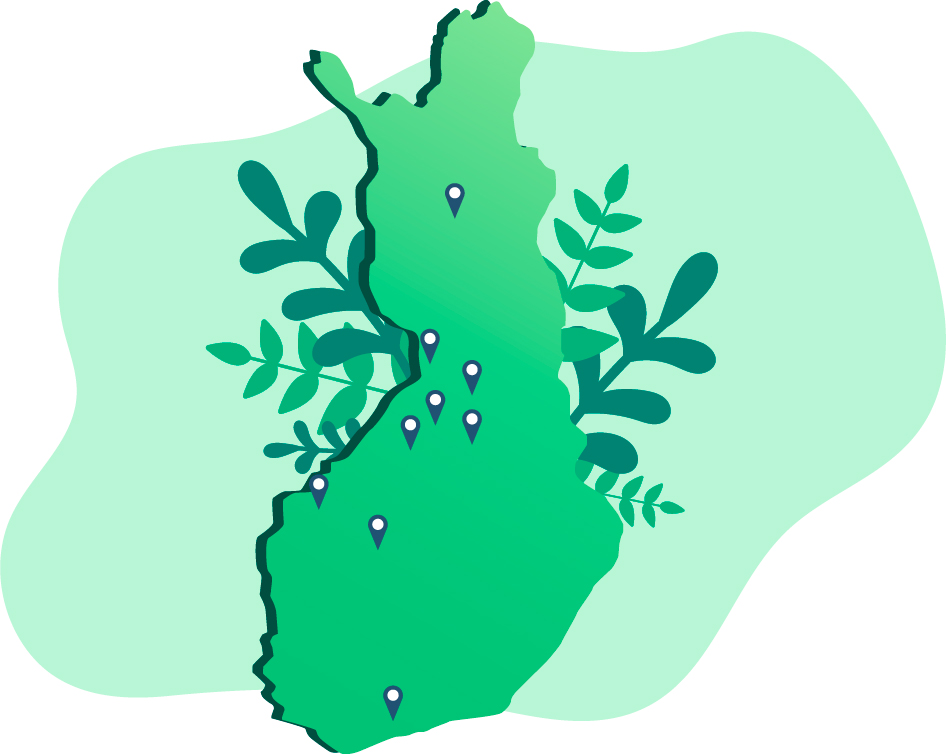
Rural Industry -Digital Innovation Hub
A strong national development and support center, boosting digital transformation in sparsely populated areas.

Rural Industry -Digital Innovation Hub
A strong national development and support center, boosting digital transformation in sparsely populated areas.
What we do?
Rural Industry Digital Innovation Hub is a strong national development and support center, boosting digital transformation in sparsely populated areas. Typically these regions have strong SME and agricultural profile and many local success stories, which deserve to be highlighted. Too often, however, these entrepreneurs lack public interest, technological awareness, capital and workforce. They deserve up-to-date services for testing, good opportunities for project networks and supportive consultancy services for marketing, personnel training and productization.
Rural Industry DIH (RiDIH) aims at filling this gap, focusing on activities that help surrounding rural areas to grow according to their full potential. Digitalization of businesses is the core of activities, realized in research & innovation, education & training, technical consultation & support, internationalization, novel business models and funding. The actions of Rural Industry DIH are in line with the regional Smart Specialization Strategies, supporting the innovation potential of SMEs in the digital transformation. Oulu Region’s smart specialization strategy recognizes the digitalization as a cross-cutting theme in the support of the chosen spearhead industries. The strategy will be updated in 2020, recognizing better the importance of the development of rural industries, like agriculture and food industry and the responding actions to the climate change.
Objectives
The digitalization challenges in the area have been identified, and DIH activities are having strong focus on them right from the beginning:
1. Companies having low digitalization level in current situation and not enough skills and resources to ramp it up alone. Especially SMEs with longer history and more aged leadership are typical cases of this kind. These companies will be helped by training and getting them aqcuainted with possibilities of digital modernization. Laboratories available added with feasibility studies gained in various projects and customer cases are a good help for

2. Companies needing help for more digital / Industry4.0 enhancements in their processes and products. In particular, there are a lot of SME manufacturing companies in the DIH region, which are lacking the needed expertize for next steps. Often there are punctual needs related to testing, analysis, robotization, new sensor solutions, IoT etc. DIH main actors have strong experience in this area and can provide test-before-invest activities in modern digital manufacturing enviroments in their labs, to help them go through demanding design phases, provide fast prototyping and POC services etc.
3. Companies needing help for their internal working processes such as e-commerce, agile working methods, quality raising, smart logistics, product information models and other new enhancements typical for the new digital age. Typically these include both working processes and supporting IT systems, both of which must be taken under active development. Many times these companies would be able to provide B2B products and services also in a globalized manner, but they need help for raising the needed skills and digital systems.Helping tools include not only training and consultation, but also networking and internationalization, in close connection with the previous system development processes.
Rural Industry DIH works in 3 neighboring NUTS3 regions, Northern Ostrobothnia, Central Ostrobothnia and Ostrobothnia. The administrational center of Rural Industry DIH is located in Ylivieska campus in Northern Ostrobothnia. The core working group consists of all major competence centers of the area. The regional councils of all the three regions are committed to support Rural Industry DIH as well as ELY Centres for Economic Development, Transport and the Environment (representing Ministry of Economic Affairs and Employment of Finland). In addition, all the local sub-regional development agencies are included in the co-operational network.